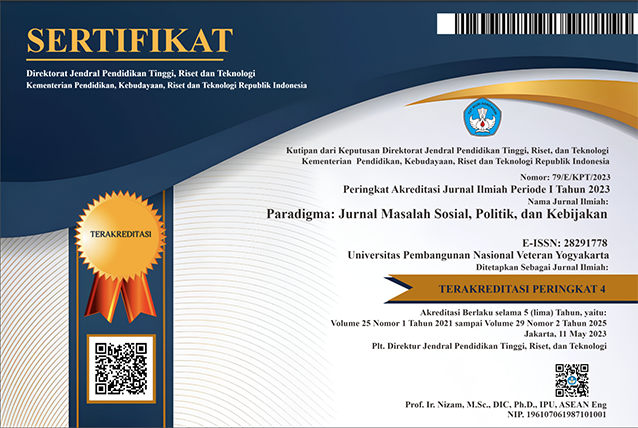Diplomasi Israel dalam Menentang Upaya Palestina Menjadi Anggota Penuh PBB
DOI:
https://doi.org/10.31315/paradigma.v17i1.2471Keywords:
Diplomacy, Israel, Palestine StatusAbstract
Palestinians submitted a proposal to become a full member of the United Nations in 2011 but did not receive enough support from the UN Security Council. Palestinians again proposed to increase membership status with the United Nations General Assembly in 2012. Israel saw the Palestinian as an attempt unilateral adverse political position Israel. This study aims to know the diplomacy Israel in opposing Palestinian efforts to become a full member of United Nations through bilateral and multilateral diplomacy. The results showed that Israel bilateral diplomacy has failed. The results showed that Israel through bilateral diplomacy has failed. Multilateral diplomacy has also failed to prevent an increase in Palestinian UM membership status. On 29 November 2012, the UN General Assembly decided to increase the status of the Palestinian to non-member observer state in the United nations. Palestinians was supported 138 countries, 41 countries abstained, and only 9 states that the Palestinians refused to increase membership status
Downloads
Published
How to Cite
Issue
Section
License
The manuscript submitted to Paradigma: Jurnal Masalah Sosial, Politik, dan Kebijakan journals are released under the license of Creative Commons Attribution-Non Commercial- ShareAlike (CC BY SA) if and when the article is accepted for publication.
We declare that:
- This paper has not been published in the same form elsewhere.
- It will not be submitted anywhere else for publication prior to acceptance/rejection by this Journal.
- A copyright permission is obtained for materials published elsewhere and which require this permission for reproduction.
Retained Rights/Terms and Conditions
Authors retain all proprietary rights to the published works, such as (but not limited to) the following rights:
- Copyright and other proprietary rights relating to the article, such as patent rights,
- The right to use the substance of the article in own future works, including lectures and books,
- The right to reproduce the article for own purposes,
- The right to self-archive the article
The right to enter into separate, additional contractual arrangements for the non-exclusive distribution of the article's published version (e.g., post it to an institutional repository or publish it in a book), with an acknowledgment of its initial publication in this journal Paradigma: Jurnal Masalah Sosial, Politik, dan Kebijakan



